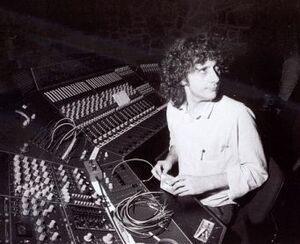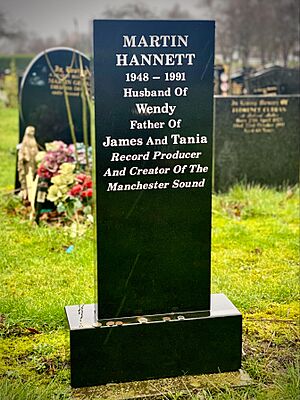Martin Hannett facts for kids
Quick facts for kids Martin Hannett |
|
|---|---|

Hannett in 1980; photo by Kevin Cummins
|
|
| Background information | |
| Also known as | Zero, Martin "Zero" Hannett |
| Born | 31 May 1948 Manchester, England |
| Died | 18 April 1991 (aged 42) Manchester, England |
James Martin Hannett (born May 31, 1948 – died April 18, 1991) was a talented British music producer and musician. He was also one of the first partners and directors at Tony Wilson's famous Factory Records. Martin Hannett helped create the sound for many popular bands. These included Joy Division, the Durutti Column, A Certain Ratio, Magazine, John Cooper Clarke, New Order, Orchestral Manoeuvres in the Dark, and Happy Mondays. He was known for his special way of producing music. He loved to use atmospheric sounds and electronic effects.
Contents
Early Life and Education
Martin Hannett was born in Manchester, England. He grew up in a working-class Catholic family in an area called Miles Platting. He went to Corpus Christi school and later to Xaverian College in Rusholme. In 1967, he studied chemistry at the University of Manchester Institute of Science and Technology (UMIST). He earned a degree but decided not to work as a chemist.
Starting a Music Career
Martin Hannett's uncle was a bass player. He gave Martin a bass guitar when Martin was 14 years old. Martin played bass with a musician named Spider Mike King. In 1973, he was also part of a band called Paradox. In this band, he played alongside Paul Young. Paul Young later became famous with bands like Sad Café and Mike + The Mechanics.
Martin Hannett started his work as a producer by creating music for an animated film. The film was called All Kinds of Heroes. He also began mixing live sound at small concerts in pubs. Some of his first production jobs included the album for Belt & Braces Road Show Band in 1975. He also recorded five songs for Pete Farrow. These songs later appeared on a collection album.
Becoming a Well-Known Producer
Martin Hannett became more famous in 1977. He used the name Martin Zero for his work. He produced the first independent punk record, which was Buzzcocks' Spiral Scratch EP. He also produced early songs for the punk poet John Cooper Clarke. Martin Hannett added drum machines and simple synthesiser sounds to John Cooper Clarke's unique spoken-word style. His first hit song as a producer was Jilted John's debut single.
Working with Joy Division
Soon after, Martin Hannett became very involved with the band Joy Division. He produced all their studio albums and singles. He used special technology to create unique sounds. He would loop musical notes and add many filters, echoes, and delays. Martin had a collection of special echo devices he called his "bluetop echo and delay boxes."
The band recorded many songs at Cargo Recording Studios in Rochdale. These songs included "Digital," "Glass," "Atmosphere," "Dead Souls," and "Ice Age." Martin Hannett's production style was unusual. He mixed drum sounds with synthesizers in a complex and very distinct way. He once said that Joy Division was "a gift to a producer" because they were open to his ideas. He produced their albums Unknown Pleasures and Closer. He also produced their hit single "Love Will Tear Us Apart." This song became very popular after the death of the band's lead singer, Ian Curtis.
Later Career and Challenges
In May 1980, Martin Hannett produced U2's first international single, "11 O'Clock Tick Tock." He was supposed to produce their first album, Boy. However, after Ian Curtis died, Martin was too upset to work. He decided not to produce U2's album.
Later, Martin had a disagreement with Factory Records. He sued the label in 1982 over money issues. They eventually settled the problem outside of court. When Martin Hannett later produced music for Happy Mondays, he worked as a freelance producer. This meant he was not a director at Factory Records anymore.
Personal Life and Passing
After leaving Factory Records, Martin Hannett's career slowed down. He later married his partner, Wendy. Martin Hannett passed away on April 18, 1991, in Manchester. He was 42 years old and died from heart failure. He was survived by his wife, his son James, and his stepdaughter Tania. His gravestone at Southern Cemetery, Manchester honors him as the creator of "The Manchester Sound."
Legacy and Tributes
After Martin Hannett's death, Factory Records released a special album. It was called Martin: The Work of Martin Hannett (FACT325). This album was a tribute to his work as a producer.
In 2007, a book called Who Killed Martin Hannett? was published by Colin Sharp. This book shared stories from Martin's friends and people he worked with. Colin Sharp was a member of The Durutti Column and a friend of Martin's.
Martin Hannett has also been shown in movies.
- In the 2002 film 24 Hour Party People, he was played by Andy Serkis. This movie tells a fictional story about Tony Wilson and Factory Records.
- In the 2007 film Control, he was played by Ben Naylor. This movie is about the life of Ian Curtis, the singer of Joy Division.
A documentary film about Martin Hannett's life was released in 2014. A book called Martin Hannett – Pleasures of the Unknown by Chris Hewitt also came out that day. Another book by Chris Hewitt, Martin Hannett, His Equipment and Strawberry Studios, was published in 2016. This book celebrated the 50th anniversary of Strawberry Recording Studios, where Martin recorded with Joy Division.
Selected Works Produced
Martin Hannett produced many albums, singles, and EPs for various artists. Here are some of his notable works:
Albums Produced
- John Cooper Clarke – Disguise in Love (1978)
- Jilted John – True Love Stories (1978)
- The Durutti Column – The Return of the Durutti Column (1979)
- Joy Division – Unknown Pleasures (1979)
- Pauline Murray and the Invisible Girls – Pauline Murray and the Invisible Girls (1979)
- John Cooper Clarke – Snap, Crackle & Bop (1980)
- Joy Division – Closer (1980)
- Magazine – The Correct Use of Soap (1980)
- A Certain Ratio – To Each... (1981)
- Joy Division – Still (1981)
- New Order – Movement (1981)
- Happy Mondays – Bummed (1988)
Singles and EPs Produced
- Buzzcocks, Spiral Scratch (1976) (as Martin Zero)
- Jilted John, "Jilted John" (1978)
- Joy Division, "Transmission" (1979)
- Orchestral Manoeuvres in the Dark, "Almost" (1979) (as Martin Zero)
- Joy Division, "Love Will Tear Us Apart" (1980)
- U2, "11 O'Clock Tick Tock" (1980)
- New Order, "Ceremony" (1981)
- The Stone Roses, "So Young" (1985)
Compilation Albums
- Martin: The Work of Martin Hannett (Factory Records, 1991)
- Zero: A Martin Hannett Story 1977–1991' (Big Beat, 2006)
Images for kids
See also
 In Spanish: Martin Hannett para niños
In Spanish: Martin Hannett para niños
 | DeHart Hubbard |
 | Wilma Rudolph |
 | Jesse Owens |
 | Jackie Joyner-Kersee |
 | Major Taylor |




